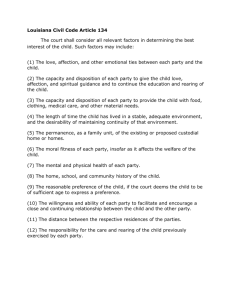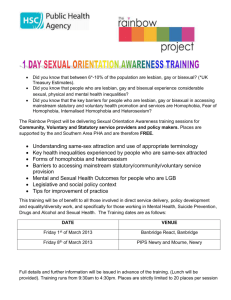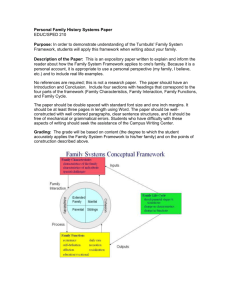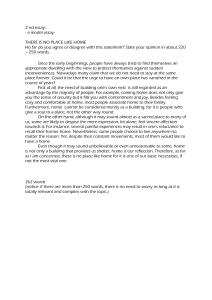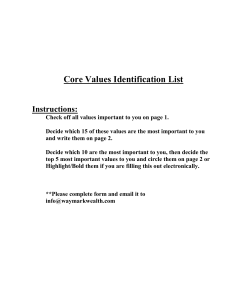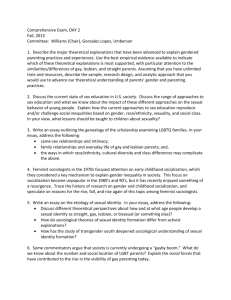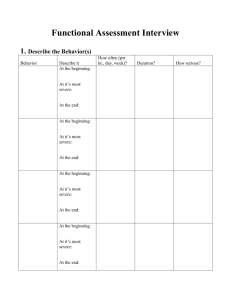Summary for Parents
advertisement
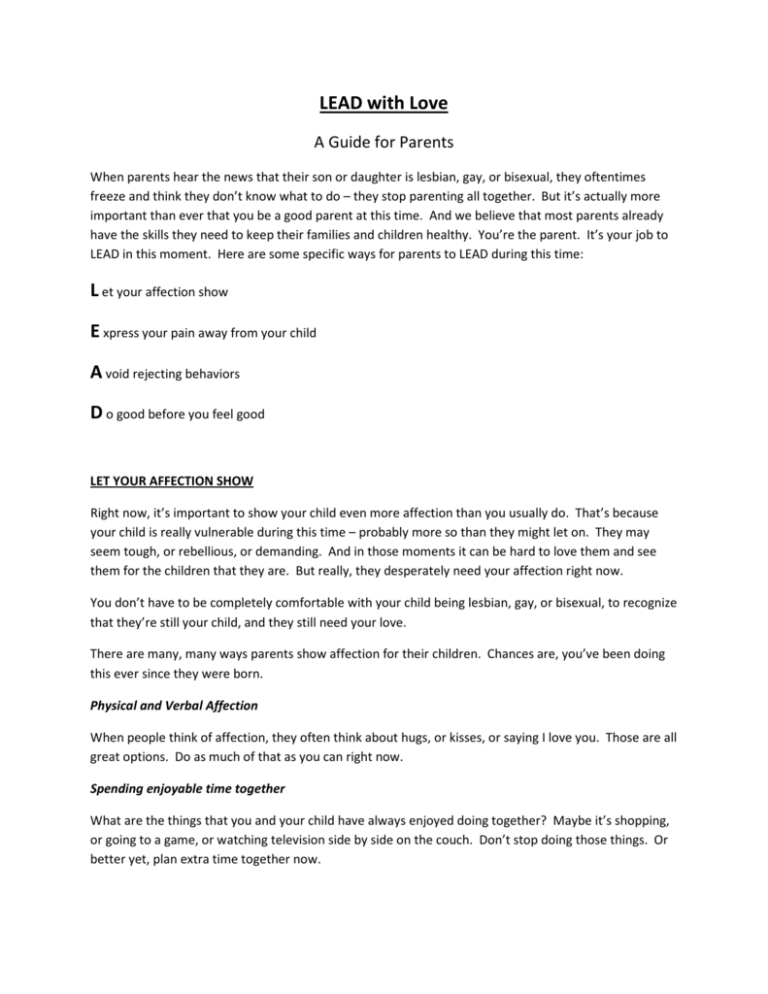
LEAD with Love A Guide for Parents When parents hear the news that their son or daughter is lesbian, gay, or bisexual, they oftentimes freeze and think they don’t know what to do – they stop parenting all together. But it’s actually more important than ever that you be a good parent at this time. And we believe that most parents already have the skills they need to keep their families and children healthy. You’re the parent. It’s your job to LEAD in this moment. Here are some specific ways for parents to LEAD during this time: L et your affection show E xpress your pain away from your child A void rejecting behaviors D o good before you feel good LET YOUR AFFECTION SHOW Right now, it’s important to show your child even more affection than you usually do. That’s because your child is really vulnerable during this time – probably more so than they might let on. They may seem tough, or rebellious, or demanding. And in those moments it can be hard to love them and see them for the children that they are. But really, they desperately need your affection right now. You don’t have to be completely comfortable with your child being lesbian, gay, or bisexual, to recognize that they’re still your child, and they still need your love. There are many, many ways parents show affection for their children. Chances are, you’ve been doing this ever since they were born. Physical and Verbal Affection When people think of affection, they often think about hugs, or kisses, or saying I love you. Those are all great options. Do as much of that as you can right now. Spending enjoyable time together What are the things that you and your child have always enjoyed doing together? Maybe it’s shopping, or going to a game, or watching television side by side on the couch. Don’t stop doing those things. Or better yet, plan extra time together now. Praise Another way parents show affection is by giving praise. When our kids know we’re proud of them, they feel loved. Tell them you’re happy about their grades. Or their performance on the field. Or their unique sense of style. Their creativity. Their bravery for sharing this news with you. Every child has something worth praising. Make sure you praise yours. Summary of affectionate things you can say or do: Things to say I love you I care about you I’m proud of you… • for being so smart. • for being so creative. • for being so athletic. • for being so kind. • for being such a good brother, or sister, or son, or daughter. • for bravely sharing this news with us. Things to do Hugs Pats on the back Backrubs Spend fun time together… • cooking • going to a movie or sporting event • shopping • playing board games • biking, throwing a ball, hiking, camping, or exercising together What if my child doesn’t seem to appreciate my affection? Sometimes children don’t seem like they appreciate the affection we show them. They shrug off our hugs, or ignore us when we say something nice to them. This is normal. They might not have the skills to say, “Thank you.” But keep showing them affection. They’re feeling it, and it helps, no matter what they say or do. EXPRESS YOUR PAIN AWAY FROM YOUR CHILD It’s normal to have negative feels about all this – whether that’s sadness, grief, anger, fear, or confusion. When we’re feeling strong things, it’s natural to want to show it. We might yell, or cry, or act out in anger. And these are all fine things to do, but only in the right places and in the right times. Generally, when you’re with your child this is never the right time to express your pain. For example, all couples fight from time to time. But most parents know that it’s a good idea not to fight in front of your kids. That’s because there are just some things that are personal and adult and we don’t need to expose our kids to them. It’s not a child’s responsibility to deal with our emotions. Anything bad that you might be feeling right now, falls into that category. It’s fine to feel these things. It’s natural to feel these things. But when you share with your child that you feel disgusted, or saddened, or scared, or overwhelmed by the news that your child is gay, it’s hurtful and damaging to them. So what we recommend parents do is: 1. Recognize when you’re feeling negative things, and give yourself permission to feel them. 2. Don’t bring these feelings to your child. 3. Express your negative feelings somewhere else. Maybe that’s your spouse, or your best friend, or a therapist. Some parents keep a journal. Or exercise. Or take a long walk alone. 4. Talk to your child when you’re feeling positive and under control again. This is going to take time and practice. Often it’s difficult not expressing these negative feelings around your child. If you find yourself caught with your child, and struggling with what to say in those moments, here are some options: • • • I care about you, but I need some time. I want to be supportive, but it’s hard for me to talk about right now. You’ve had time to work through this, I need some time as well. AVOID REJECTIONG BEHAVIORS Rejection is bad for kids. Parents are the most important people in their children’s lives. And when they reject their kids, the effects are profound. In an article published in Pediatrics – the official journal of the American Academy of Pediatrics – researchers compared children from families that expressed low levels of rejection toward their child’s sexual orientation to children whose parents were highly rejecting. The children with parents who were rejecting of the fact that they were lesbian, gay, or bisexual had dramatically higher rates of suicide attempts, illegal drug use, and sexual risk taking. When parents are rejecting, children have more than 8 times the risk of attempting suicide, and more than 3 times the risk of trying illegal drugs or having unprotected sex. So parents really matter. And parent rejection is incredibly harmful. So what exactly do we mean by rejection? When we think about rejection, most people think about behaviors like hitting a child, calling him a name, or throwing him out of the house. And certainly these are real rejecting behaviors that parents need to avoid. BUT what most parents don’t realize is that there are more subtle behaviors that kids also experience as rejection. And research shows that even these more subtle forms of rejection can be harmful. Some of the behaviors that parents need to avoid include: • • • Verbal or physical abuse Invalidating the news (e.g., suggesting that this is a phase; refusing to believe what they’ve told you) Encouraging your child to keep their sexual orientation a secret. • • • • Suggesting that your child should “tone down” their looks or actions so that they seem less gay. Blaming your child for negative reactions they might be experiencing (e.g., saying to your child, “if you didn’t act so gay, kids at school might leave you alone”). Limiting access to lesbian, gay, or bisexual resources (e.g., not allowing your child to go to a youth support group, or to participate in the school’s gay-straight alliance). Attempting to change your child’s sexual orientation by taking them to a therapist or religious leader. Most parents do these things out of concern, thinking that they’re somehow protecting their child. But in reality they feel extremely rejecting. So for example, parents might tell their children not to tell other people about their sexual orientation because they’re concerned about the possibility that they’ll get negative reactions. But in reality, what that communicates to your child is that this is something to be ashamed or embarrassed of. It feels very rejecting. So we encourage parents to take a good hard look at their behaviors. Catch yourself doing these things. And then stop yourself whenever you can. If you find yourself unable to control these rejecting behaviors, try the techniques we talked about in “Express your pain away from your child.” 1. 2. 3. 4. Recognize when you’re feeling these things, and give yourself permission to feel them. Don’t bring these feelings to your child. Express them somewhere else. Talk to your child when you’re feeling positive and under control again. DO GOOD BEFORE YOU FEEL GOOD Although most parents already have all the skills we describe above, that doesn’t necessarily mean they’ll be easy. It’s hard to do the right thing when you’re feeling bad. Getting comfortable with this news and with your child’s sexuality is a process. It takes time before you’ll start to feel good again. For some parents the journey takes months, for others it takes years. But that’s a long time to let pass before you start doing the right things for your child – before you start showing affection or cutting out those rejecting behaviors. But you don’t have to be at a place of acceptance or comfort to start doing the right thing for your child. This is why we tell parents, do good before you feel good. Parenthood is all about doing the right thing, even when you’re feeling bad or overwhelmed. Remember cuddling your newborn when she cried for hours and you were at your wit’s end? Or attending that endless school play? It’s a parent’s job to do the right thing, even when it’s hard. So give yourself permission to struggle some with the news that your child is lesbian, gay, or bisexual. Expect that it will take some time to work through that. You’ll need that time. But your child needs you to step up and be a loving, supportive parent right away. In conclusion You’re making the first step toward helping your family adjust successfully to this news. The fact that you’ve taken the time to watch our film and read through this guide shows how much you care about your child. That care and concern will be so helpful to you in the months to come. Channel your concern for your child, and try to LEAD your family. L et your affection show E xpress your pain away from your child A void rejecting behaviors D o good before you feel good Doing these four concrete things will help keep your child happy, healthy, and safe. And it will help your family stay close and connected during this time. Huebner, D. M., & Rullo, J. E. (2010). LEAD with Love: A Guide for Parents.
